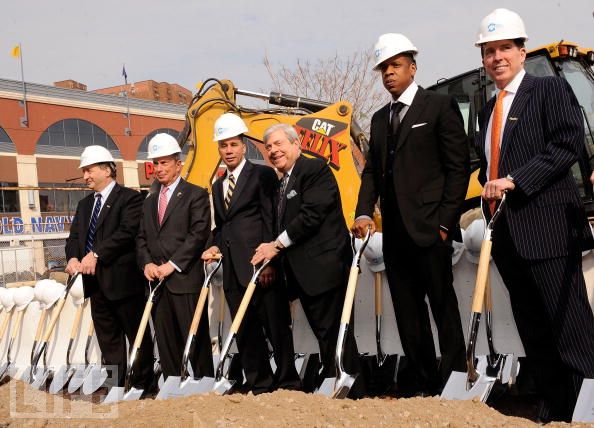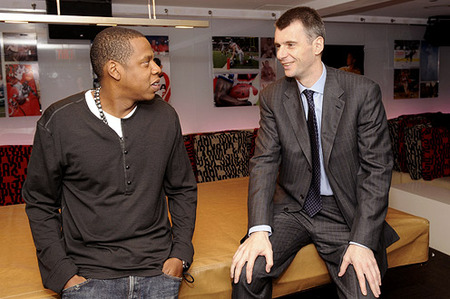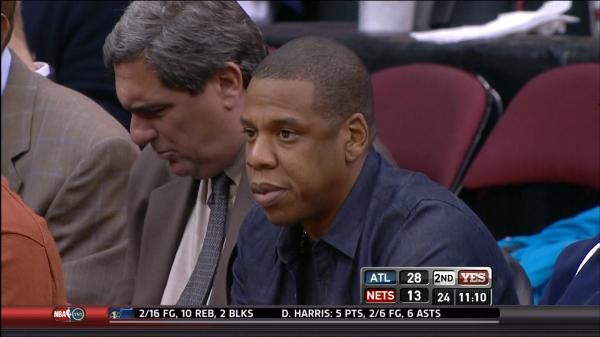Everyone knows Shawn Carter’s story by now. Every time the rap mogul announces a new business venture, promotes an upcoming album, or graces the cover of a magazine we are reminded of how he rose from humble beginnings, raised by a single mother in Marcy Projects, then sold drugs by the age of 13, and eventually formed Roc-A-Fella Records with co-founders Damon Dash and Kareem “Biggs” Burke who believed in his rap talent when no one else in the music industry did. Jay-Z’s rise from Brooklyn to the top of the business world has been well-documented but when New York Times reporter David Halbfinger attempted to interview the hip-hop icon last month, he had a different angle that he wanted to explore.
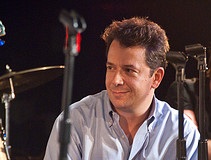 With the Barclays Center scheduled to open on September 28 with a Jay-Z concert, Halbfinger hoped to write what he called a “smart story about a smart guy” and speak to the Brooklyn Nets co-owner about his role with the team. Ironically, the Yale graduate, who has covered the 2004 presidential campaign, the inner workings of the movie business, and New Jersey state politics in his 15 years with The Times, interviewed Jay-Z in 2007 (along with Times music/culture reporter Jeff Leeds) about his “American Gangster” album. It seemed to be a no-brainer that Jay-Z would participate in Halbfinger’s story since they had great chemistry during their first interaction where Jay-Z actually rapped over the phone as he was finalizing the project in the recording studio. However, Jay-Z’s representatives declined an interview request and according to Halbfinger even tried to prevent the story from being published. This didn’t stop him from doing extensive research and speaking with more than 30 people ranging from music executives to sports agents and even key executives within the Nets organization such as General Manager Billy King, developer Bruce Ratner, and CEO Brett Yorkman.
With the Barclays Center scheduled to open on September 28 with a Jay-Z concert, Halbfinger hoped to write what he called a “smart story about a smart guy” and speak to the Brooklyn Nets co-owner about his role with the team. Ironically, the Yale graduate, who has covered the 2004 presidential campaign, the inner workings of the movie business, and New Jersey state politics in his 15 years with The Times, interviewed Jay-Z in 2007 (along with Times music/culture reporter Jeff Leeds) about his “American Gangster” album. It seemed to be a no-brainer that Jay-Z would participate in Halbfinger’s story since they had great chemistry during their first interaction where Jay-Z actually rapped over the phone as he was finalizing the project in the recording studio. However, Jay-Z’s representatives declined an interview request and according to Halbfinger even tried to prevent the story from being published. This didn’t stop him from doing extensive research and speaking with more than 30 people ranging from music executives to sports agents and even key executives within the Nets organization such as General Manager Billy King, developer Bruce Ratner, and CEO Brett Yorkman.
When the article hit the front page of The New York Times on August 16 it was the first time that Jay-Z’s ownership stake with the Nets had been clearly defined as an astonishing one-fifteenth of one percent and slightly under a fifth of a percent for the arena. We were previously unaware of a mandatory meeting that Jay-Z had to attend in 2003 with NBA commissioner David Stern to explain why he stabbed record producer Lance “Un” Rivera. (In 2001, Jay-Z was given three years’ probation in a New York criminal courtroom for stabbing Rivera in 1999 for what he believed was Rivera bootlegging his “Volume 3: The Life & Times of S. Carter” album. In a 2004 interview with New York radio station Hot 97, Rivera admitted that the incident was “staged” to promote the album.) There was also startling information received from an undisclosed source that the Nets’ new uniforms designed by Jay-Z were met with resistance from the NBA because it was perceived that black players wearing black wouldn’t translate well on TV.
I spoke with Halbfinger at great length to talk about the article that so many people are still talking about two weeks after it was released.
Were you at all reluctant to proceed with the story after Jay-Z’s reps turned down your interview request, especially since you had such a great rapport with him in your 2007 interview with Jeff Leeds?
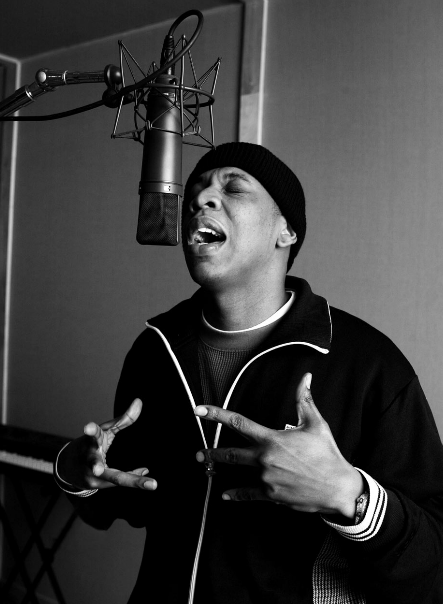 No, it just means a challenge. If someone doesn’t want to tell you something or information is hard to get it then the fun of the job is digging. Digging requires digging. We are diggers. Sometimes you might be digging as a watchdog on the government and sometimes there might just be information that people don’t want to tell you because it’s not in their interests and you have to kind of look to see how you find your ways to get it. The first couple of calls I made was to try and see if Jay-Z would talk to us because that would take the story in a very friendly direction presumably. There are issues with doing that. The issue if you get an interview is how much do you allow the interview to shape the direction of your reporting? In this case his people said, “No way, no how!” In fact, they tried to shut the story down arguing that this is just a hype story and why don’t we wait until later when the arena is open. They suggested that maybe he would talk to us then. We had our reasons for proceeding right now. In a way, as a reporter when they tell you they are not going to cooperate with you it’s almost liberating because anything I get is gravy. When you are cooperating with somebody and they are giving you an interview there is a kind of etiquette of those things that can in some ways cause some complications. Until an interview happens and even sometimes afterwards they can kind of hold it over your head. If you start kicking over too many rocks and calling people they don’t really want you calling they might say they won’t do the interview. Then you’ve lost an interview after you had it. But this was liberating.
No, it just means a challenge. If someone doesn’t want to tell you something or information is hard to get it then the fun of the job is digging. Digging requires digging. We are diggers. Sometimes you might be digging as a watchdog on the government and sometimes there might just be information that people don’t want to tell you because it’s not in their interests and you have to kind of look to see how you find your ways to get it. The first couple of calls I made was to try and see if Jay-Z would talk to us because that would take the story in a very friendly direction presumably. There are issues with doing that. The issue if you get an interview is how much do you allow the interview to shape the direction of your reporting? In this case his people said, “No way, no how!” In fact, they tried to shut the story down arguing that this is just a hype story and why don’t we wait until later when the arena is open. They suggested that maybe he would talk to us then. We had our reasons for proceeding right now. In a way, as a reporter when they tell you they are not going to cooperate with you it’s almost liberating because anything I get is gravy. When you are cooperating with somebody and they are giving you an interview there is a kind of etiquette of those things that can in some ways cause some complications. Until an interview happens and even sometimes afterwards they can kind of hold it over your head. If you start kicking over too many rocks and calling people they don’t really want you calling they might say they won’t do the interview. Then you’ve lost an interview after you had it. But this was liberating.
Jay-Z has been featured in The Times very often throughout his career including your story and a large feature that focused on his day-to-day operations when he was President of Def Jam. It’s somewhat shocking to know that you were turned down. I mean this is The New York Times. The Nets General Manager Billy King was profiled in the paper a few weeks ago. What was your pitch?
It was very straightforward and exactly how the story turned out to be. [He reads an excerpt from the initial email sent to Jay-Z’s representatives that speaks on his goal of writing a “high-profile piece delving into Jay-Z’s important but not widely understood role with the Nets.”] I also reminded them that I wrote the “American Gangster” piece.
That’s interesting. Maybe they were concerned you would reveal how much of the team he didn’t really own. Many people were under the impression that it was 10 percent or maybe even 5 percent.
It’s very simple. He invested $1 million and that was out of a $300 million purchase price. That’s one-third of one percent, period. End of story.
Then that percentage went even lower?
When Mikhail D. Prokhorov (the billionaire owner of the Brooklyn Nets) bought 80 percent of the team what that does is squeezes down the 100 percent of all the other people into 20 percent. Everybody who had a piece up to that point had their stake divided by five. That’s it. Clearly what Jay’s stake is worth now, you could calculate it if you knew what the team was valued at based on Prokhorov’s purchase and then you could guess how much it’s gone up or down since then. But it’s just simple math.
But doesn’t that now explain why Jay-Z wouldn’t want to speak with you. You were going to talk to him about owning one-fifteenth of one percent. For a guy who uses his ownership with the Nets for bragging rights in his music that may be damaging. It changes people’s perception of King Hova?
First of all, I didn’t pitch them about wanting to know how much he owned. It was clearly one of the questions I had but it was not like I was leading with my chin. I wasn’t like, “Hey, I’d really like to ask Jay-Z exactly what his partnership stake is and while you are at it can you tell me his address and phone number?” I would argue with you on the notion of whether it undercuts his right to brag. In a way, you could brag that you had a larger piece of the Nets or you could brag that you’ve turned so much less of a piece of the Nets into so much more in perception. The judo involved in image-making and promotion and perception is reality that he has achieved with such a little percentage is something more to brag about than just putting on a larger junk of change or having a larger percentage.
Clearly he is using it to his advantage with plans for a 40/40 Club at the Barclays Center, a Rocawear store outside and a bar at the area that will serve the Armand de Brignac champagne that he promotes in his music and videos. You don’t believe that he is getting a special deal to do all of this?
According to CEO Brett Yormark there were no sweetheart deals. It’s not like he showed me the contracts to verify that. Let’s be clear. I’m still skeptical that he did get a preferred deal, not a sweetheart deal. It is interesting that you don’t see others in there. I didn’t even get into this in the paper but it’s not like he’s known for outbidding all the competition. Do you recall the Meadowlands arena where the Nets used to play? It used to be the Continental Arena. And then it became the Izod arena. Do you know who Izod was chosen over? Rocawear. There was another bidder too. I don’t think Izod paid more money. I think the deal was at the same price as Rocawear but I think Izod was chosen over Rocawear anyway. There must have been other reasons that made it a more attractive deal for the Meadowlands. He’s a guy who is known for getting a good deal. It was enough for me to say that he’s got four different business lines going here. He has the advertising agency, the club, the clothing and the champagne and who knows if there is more. Don’t forget the concerts he is going to do.
Who did you speak with after Jay-Z declined to be interviewed?
I spoke with CEO Brett Yormark. I talked to developer Bruce Ratner at length. I talked to other investors in the team. I talked to Billy King, the G.M. I talked to some agents and people in the music industry. One of the things that didn’t make it into the piece was sort of the question as to how heavily Jay would work to promote the arena with other acts. For example, would he stop to pick up the phone if down the road the Brooklyn arena is competing with an act for Madison Square Garden? Would he call an artist and say that this would be a personal favor if you come here? I tried to do 360 degrees around this story.
We had no idea that Jay had to meet with David Stern especially with him having such a small stake. We definitely didn’t know he had to explain why he stabbed Lance Rivera, an issue that is long-forgotten in people’s minds.
Well, this was 2003 and his sentencing was only in 2001 if memory serves and the incident happened in 1999. It wasn’t that old and this is a much earlier time in the NBA and its attitude toward hip-hop and rappers. There was a time when they were really trying to keep that influence to a minimum. The dress code happened a little while later in the NBA. As it was described to me, maybe if he had not been a rapper but he did have a guilty plea in his past he wouldn’t have had to sit with Stern but perhaps because he was both a rapper and admitted to a stabbing that he had to go have a face-to-face and let Stern look him over. Remember he was huge in hip-hop but not the transcendent icon that he is today.
Was he interviewed by Stern because all owners have to meet with the commissioner?
I didn’t get the story from Stern. I got it from Ratner. His impression was that because Jay had the incident in his past and his line of work those things combined led Stern to ask for the meeting to size him up.
In the article you spoke about a time when Jay-Z didn’t appear at Nets’ games due to what a source described as him being “brand-conscious?” Have you ever heard of a team owner not showing up to games because his team isn’t performing well?
That was the message from the quote. He attended much more frequently when they were doing well. When they started to stink, while he would show up occasionally, he wouldn’t show up very often. The implication is that it wasn’t adding luster to him to be as visually associated with a really losing team. There’s a song (“Niggas in Paris”) where he raps, “The Nets could go 0 for 82, and I look at you like this shit gravy.” It doesn’t matter.
There were rumors years ago that he had obligations to attend a certain amount of Nets home games. You talked about him attended a few board meetings. Is that optional for him or mandatory?
I don’t know the details so I can’t answer you definitively on this about what he is required to do and what he is merely asked to do. I can tell you that there are requirements and levels of commitment and involvement. Does that include a certain number of games? It might. It wouldn’t be shocking. It’s my understanding that his deal changed to some degree, although I am not sure how, once they got to the construction phase and the promotion and marketing phase and it became clear that he was going to be so heavily involved on the input side. Clearly, it doesn’t seem that anybody is complaining that he is not doing enough. They’ve only had two board meetings of the arena and he’s been to both.
There’s been this impression that Jay-Z will help sign players who are fans of his music or respect him as a mogul. That hasn’t necessarily happened yet. You talked about Shareef Abdur-Rahim almost being acquired by the Nets.
The record is what the record is. He didn’t get LeBron although there was a lot of hype that perhaps he could. I’m told that he was very much involved in strategizing to try to get LeBron. The story I was told by Billy about trying to get Carmelo was that they were in L.A. for the All-Star game last year and in two hours he is across the city and they call him and say, “Hey can you talk to Carmelo?” And he says, “Yeah, I’m there.” It’s kind of cool but it’s not as orchestrated an attempt as the LeBron thing was. But let’s hope we don’t have to see too many more of those LeBron things. I don’t think he can turn someone around 180 degrees but could he put some spin on the ball in the Nets favor? I think that’s highly likely. With Shareef, he was a huge Jay-Z fan according to his agent. They had met previously. He had been on stage at Jay-Z concerts. The guy was in love with his music. That’s certainly in Jay-Z’s favor but did Jay making that call make a difference? I don’t know. Ultimately, it was a moot point because he didn’t come to the Nets for basketball and medical health reasons. With Vince Carter was it the phone call from Jay-Z that made him explode for 37 points or was it a better night’s sleep, no heckling from the fans and a really good meal? Who knows?
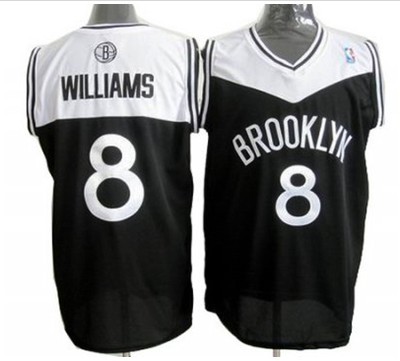 You addressed the Nets’ uniforms in the piece and how it was perceived by the league as a bad idea because of how African Americans would look in black? Please elaborate.
You addressed the Nets’ uniforms in the piece and how it was perceived by the league as a bad idea because of how African Americans would look in black? Please elaborate.
Let’s be clear. The NBA’s spokesman officially and very adamantly denies what was printed that there was this feeling that a black and white color scheme particularly with heavy use of the color black would look poor on its athletes on TV. A person aware of these discussions was very clear to me that this is the concern rightly or wrongly. What is the truth? I don’t know and we can’t know. It’s possible that what was said along these lines was someone misrepresenting the league’s view. All I know is that I am told it was said.
Either way it did get approved.
Yes, there was resistance but it was approved. They had three color schemes in which black was a color but they hadn’t had black and white period. I was told it took a couple of calls to the deputy commissioner, once to make the case and appeal to them to back off. Then there was a second call again to make the case in which they were told they didn’t like the idea but were going to place some faith in Jay.
You state in the piece that you gathered some information on Jay-Z from the “Empire State of Mind” book by Zack O’Malley Greenburg. What else did you use?
Yeah, I did use that book because he had a chapter in there all about that champagne. He has a pretty decent account of the major moments in Jay’s business career. But that was the only thing I directly took out of that book. I read a lot of clips and blogs. There’s a lot of stuff published by opponents and critics of the Atlantic Yards project in Brooklyn, online in particular. I had to make sure I didn’t miss anything he said on behalf of the team so you have to do a thorough Web search of that. I looked for references to the Nets in Jay’s lyrics as well.
How long did this process take?
It took three weeks of work.
Is there anything you wish you would have added?
My only wish was that we had more space in the paper because I had a lot more to say if I could have.
Please name a few.
It would have been fun, for example, to do a little more of a chronology here and mention more lyrics tied to the Nets. It would have been fun online to link to some of his lyrics and music videos. I had a correction in the piece because we mentioned Robert Rubin, the former Treasury secretary. It was the wrong Robert Rubin. It was Robert Rubin with a different middle initial who was formerly the chairman of the Brooklyn Museum. So we had a correction in the paper. I checked that fact but didn’t check it clearly enough.
What feedback have you received on the article?
It was one of the top read stories of the day and the most e-mailed and most blogged about. I know the Nets are aware of the story and besides the league’s concern about the issue of uniform colors and skin color, I think by and large they were pleased with the story. There are people in Brooklyn who are critical of the project who are somewhat critical of the piece because it’s too laudatory but not everyone is going to be happy.

